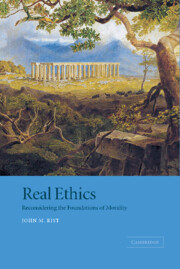Book contents
- Frontmatter
- Contents
- Acknowledgements
- Introduction: Ethical crises old and new
- 1 Moral nihilism: Socrates vs. Thrasymachus
- 2 Morals and metaphysics
- 3 The soul and the self
- 4 Division and its remedies
- 5 Rules and applications
- 6 The past, present and future of practical reasoning
- 7 Autonomy and choice
- 8 Ethics and ideology
- 9 God and ethics
- Bibliography
- Index
3 - The soul and the self
Published online by Cambridge University Press: 16 January 2010
- Frontmatter
- Contents
- Acknowledgements
- Introduction: Ethical crises old and new
- 1 Moral nihilism: Socrates vs. Thrasymachus
- 2 Morals and metaphysics
- 3 The soul and the self
- 4 Division and its remedies
- 5 Rules and applications
- 6 The past, present and future of practical reasoning
- 7 Autonomy and choice
- 8 Ethics and ideology
- 9 God and ethics
- Bibliography
- Index
Summary
MULTIPLE SELVES
Every writer on ethics is an avowed or closet naturalist. Not even the positive lawyer tells us how we should live, what it is right to do, or what is good for us, unless he avows or assumes a thesis of what we are or could be. All such theorists provide a description, however incomplete, of the relevant features of human nature, and insofar as they presume knowledge of that nature, all prescriptions based on them are ‘naturalist’. Even revisionists who argue that claims as to what is ‘natural’ are social constructs for purposes of control or exploitation – men, for example, may justify the subordination of women in terms of biological finality – must concede that although ‘natural’ accounts, in this case of ‘gender’, depend on social conditioning, there are limits to what socializing alone can do. Unless socializing can be extended to include gross surgical manipulation, no amount of it will permit males to conceive.
All ethical theories are also natural-law theories in that they assume that the maxim ‘Ought implies can’ – though at times misleading – indicates an important truth: it is no use telling us we ought to walk more if we have no legs, or to think more if our mind is insufficiently educated. Anatomy is at least a condition of destiny, as generally are physiology and psychology insofar as they identify the parameters within which human beings can function, setting limits – within roughly accepted bounds of sanity – on the laws we prescribe and targets we set for ourselves – whether in the physical domain (no-one will ever run a one-minute mile) or in the moral (no-one will ever perform all his actions from entirely pure motives).
- Type
- Chapter
- Information
- Real EthicsReconsidering the Foundations of Morality, pp. 61 - 94Publisher: Cambridge University PressPrint publication year: 2001



